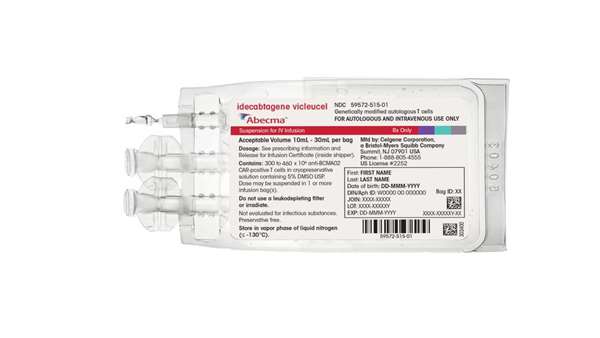The U.S. Food and Drug Administration approved Abecma (idecabtagene vicleucel), a cell-based gene therapy to treat adult patients with multiple myeloma who have not responded to, or whose disease has returned after, at least four prior lines (different types) of therapy. Abecma is the first cell-based gene therapy approved by the FDA for the treatment of multiple myeloma.
“The FDA remains committed to advancing novel treatment options for areas of unmet patient need,” said Peter Marks, M.D., Ph.D., director of the FDA’s Center for Biologics Evaluation and Research. “While there is no cure for multiple myeloma, the long-term outlook can vary based on the individual’s age and the stage of the condition at the time of diagnosis. Today’s approval provides a new treatment option for patients who have this uncommon type of cancer.”
Multiple myeloma is an uncommon type of blood cancer in which abnormal plasma cells build up in the bone marrow and form tumors in many bones of the body. This disease keeps the bone marrow from making enough healthy blood cells, which can result in low blood counts. Myeloma can also damage the bones and the kidneys and weaken the immune system. The exact cause of multiple myeloma is unknown. According to the National Cancer Institute, myeloma accounted for approximately 1.8% (32,000) of all new cancer cases in the United States in 2020.
Abecma is a B-cell maturation antigen (BCMA)-directed genetically modified autologous chimeric antigen receptor (CAR) T-cell therapy. Each dose of Abecma is a customized treatment created by using a patient’s own T-cells, which are a type of white blood cell, to help fight the myeloma. The patient’s T-cells are collected and genetically modified to include a new gene that facilitates targeting and killing myeloma cells. Once the cells are modified, they are infused back into the patient.
The safety and efficacy of Abecma were established in a multicenter study of 127 patients with relapsed myeloma (myeloma that returns after completion of treatment) and refractory myeloma (myeloma that does not respond to treatment), who received at least three prior antimyeloma lines of therapy. About 88% of patients in the study group had received four or more prior lines of antimyeloma therapy. Overall, 72% of patients partially or completely responded to the treatment. Of those studied, 28% of patients showed complete response—or disappearance of all signs of multiple myeloma—to Abecma, and 65% of this group remained in complete response to the treatment for at least 12 months.




ارسال به دوستان